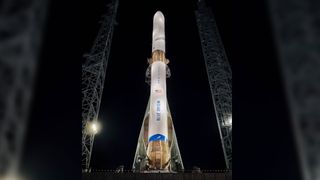
(Image credit: Blue Origin)
Blue Origin’s powerful new orbital rocket has risen on the launch pad to prep for a debut flight that could happen soon.
New Glenn was stacked at Launch Complex 36 at Cape Canaveral Space Force Station in Florida, which is next door to NASA’s Kennedy Space Center. Blue Origin has not announced an official launch date for the big new rocket, but media reports have suggested it could occur in late 2024.
“Gone vertical,” Blue Origin officials wrote Thursday (Nov. 21) on X, formerly Twitter, with a photo of the rocket. The company’s suborbital system, New Shepard, coincidentally made its latest flight just hours later on Friday (Nov. 22) morning with six people on board, including the 100th woman to fly to space.
Related: Blue Origin stacks huge New Glenn rocket ahead of 1st launch (photo)
The New Glenn launch is slated to carry one of the company’s new Blue Ring spacecraft on a National Security Space Launch certification flight called DarkSky-1 . The U.S. Defense Innovation Unit is sponsoring the effort.
New Glenn comes in two- or three-stage variants with a fully reusable first-stage booster. The two-stage version is 270 feet (82 meters) tall, while the three-stage variant is 313 feet (95 m) tall. For comparison: SpaceX’s Falcon 9 rocket is between 209 feet (63.7 m) and 230 feet (70 m) tall, depending on its payload.
Blue Ring, the spacecraft platform, is designed to be a service module for other spacecraft or instruments to attach to. The platform is designed to either remain on the rocket or to deploy, depending on the mission’s needs. Blue Origin officials recently wrote in a company statement that Blue Ring can “easily maneuver through multiple orbits.”
New Glenn was expected to fly for the first time in October 2024 with NASA’s twin ESCAPADE Mars probes on board, but the space agency stood down from the launch out of a concern about cost overruns associated with the new and therefore somewhat developmental rocket line.
Join our Space Forums to keep talking space on the latest missions, night sky and more! And if you have a news tip, correction or comment, let us know at: community@space.com.

